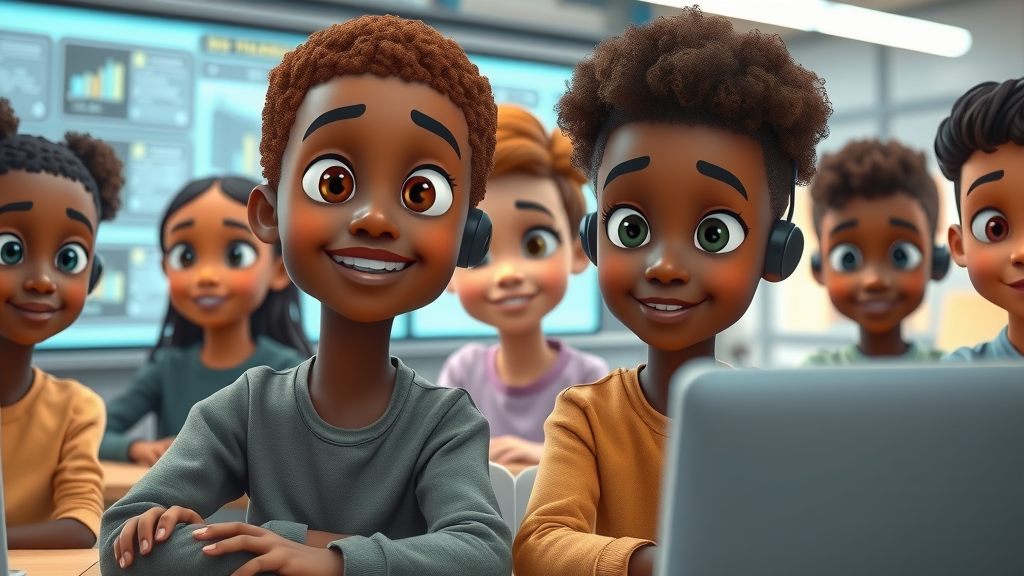Did you know: Over 65% of jobs emerging in Africa’s AI economy will require distinctly human skills instead of just coding? As the continent rides the wave of artificial intelligence and digital transformation, it’s not those with the deepest code libraries who will flourish—it’s adaptive minds, empathetic leaders, and creative thinkers. This article explores why AI skills for the African workforce should focus on what makes us distinctly human, and which competencies will truly define Africa’s place in the global AI revolution.

Overlooked Realities: Why 'Human' AI Skills for the African Workforce Outrank Coding in the AI Economy
- Startling Fact: Over 65% of jobs in Africa's AI economy will demand uniquely 'human' skills that machines can't replicate. Despite the buzz around programming, it's AI skills for the African workforce—in empathy , critical thinking , and adaptability —that will truly define the future of work on the continent.
When we picture the future of work in Africa, coding boot camps and tech training frequently dominate the headlines. And yet, research reveals that the majority of new roles created by the AI economy across Africa will rely heavily on ‘human’ AI skills—competencies that are tough to automate, like creativity, ethical judgment, and cultural fluency. While machine learning and data science may power the algorithms, it’s the distinctly human attributes that shape their impact.
For the African workforce, thriving within the growing artificial intelligence sector means developing a different set of skills—ones that cannot simply be programmed. These are the qualities that drive innovation, collaboration, and resilience, making African workers indispensable in the face of global AI disruption. As young people across the continent enter the digital economy, it’s time to shift our focus from technical prowess alone to unlocking our uniquely human superpowers.
In the coming five years, AI-powered technologies will reshape sectors from Cape Town to Nairobi, putting pressure on businesses, educational institutions, and governments to rethink skills development. With much of Africa’s talent pool across the continent under 30, the opportunity—and responsibility—to redefine the future workforce has never been greater. The next generation of African leaders must be as adept at reading emotions and communicating ideas as they are at using AI tools.
Essential Human-Centric AI Skills for the African Workforce: A Personal Perspective on Thriving in the Artificial Intelligence Age
"As AI transforms the global economy, Africa's advantage lies not just in technology adoption, but in leveraging the power of irreplaceable, human-centric AI skills."
As an African professional navigating the surge of artificial intelligence in our industries, I’ve seen firsthand how soft skills can be game-changers. In vibrant business hubs from Lagos to Johannesburg, it’s the combination of critical thinking and cultural awareness that determines who gets ahead. Coding can unlock entry points, but what sets leaders apart—whether in fintech, health, or creative sectors—is their mastery of complex people dynamics, negotiation, and creative problem-solving.
AI cannot yet replicate the value of authentic human connection or nuanced decision making. In diverse African societies, cross-cultural competence and emotional intelligence are vital. Whether it’s collaborative brainstorming in a Cape Town startup or resolving disputes in a pan-African corporation, the soft power of human creativity, empathy, and adaptability consistently trumps even the most sophisticated machine learning models.

How Africa's AI Economy is Redefining the Future of Work: Closing the Skills Gap Beyond Code
The AI economy sweeping across Africa is upending the traditional idea that technical skills—especially coding—are the sole passport to success. While programming and understanding AI technologies are undeniably important, they no longer guarantee job security in a rapidly changing global workforce. Instead, Africa faces a unique opportunity to leapfrog skills development by focusing on human-centric competencies that machines simply cannot match.
This shift is redefining the future of work for the African workforce. As automation handles routine data-driven tasks, jobs are being redesigned to emphasise higher-level thinking, people management, and ethical judgment. The famous ‘skills gap’ that many fear is not just technical—it is a human gap, marked by a shortage of creative, adaptable, and emotionally intelligent professionals. Addressing this means looking beyond the code, to the core of what makes the African workforce resilient and globally competitive.
Technological infrastructure is improving across African countries, providing fertile ground for AI development and digital transformation initiatives. Yet, to unlock the full potential of AI for economic growth and job creation, public and private sector stakeholders must invest as much in soft skills training and lifelong education as they do in technical upskilling. This combined approach is essential for building a sustainable and inclusive workforce prepared to take on new, AI-powered roles.
The Growing Role of Artificial Intelligence in South Africa and the Wider African Workforce
South Africa , often regarded as a bellwether for technological progress in Africa, is leading the charge in adopting AI technologies within banking, healthcare, and agriculture. Cape Town and Johannesburg tech hubs are teeming with startups leveraging machine learning to solve unique African problems—from drought prediction to combating cybercrime. However, it's not the engineers alone who are driving these changes—it's cross-disciplinary teams capable of blending technical insight with real-world problem-solving.
Across Africa, the rise of AI is pushing organisations to rethink hiring and workforce development priorities. Soft skills such as teamwork, negotiation, and multicultural communication are now key differentiators as firms compete in a global AI marketplace. As new roles emerge and traditional ones evolve, developing both foundational digital skills and uniquely human capabilities is now seen as essential for building a skilled workforce prepared for the future.
For African countries grappling with high youth unemployment, investing in AI-skills training is not just about economic competitiveness—it’s about inclusive job creation and social stability. By fostering an environment where young people can build resilience, creativity, and critical thinking, South Africa and its neighbours are setting an example for others seeking to bridge the skills gap in the age of AI.
The Impact of the Global AI Revolution on Skills Demand in Africa
The global AI boom has changed the nature of work around the world, raising the bar for what it means to remain relevant and employable. In African contexts, the implications are profound: AI could streamline everything from supply chains to education, but only if there’s a workforce ready to manage, interpret, and thoughtfully apply these technologies. Tools like generative AI, predictive analytics, and robotics are only as effective as the people guiding their use.
As AI policies evolve and multinational corporations set up shop in Africa, the demand is shifting away from rote software development toward high-touch roles that require interpretation, empathy, and cross-functional collaboration. African youth are increasingly expected to combine technical literacy with skills in negotiation, leadership, and social awareness. It’s these hybrid professionals—part technologist, part problem-solver—that will power Africa’s next wave of economic growth.
The data is clear: the most valuable ai skills for the African workforce now include everything from ethical decision making to adaptive communication. As the future of work unfolds, workers must be prepared to respond to complex challenges with uniquely African solutions—ones that draw on deep social contexts and shared community experience as much as on global innovation trends.

Top 5 Must-Have 'Human' AI Skills for the African Workforce in the Artificial Intelligence Era
- Complex Problem Solving and Critical Thinking
- Emotional Intelligence and Adaptability
- Creative Innovation and Collaboration
- Ethical Decision Making in the AI Economy
- Digital Communication and Cross-Cultural Fluency
Let’s look deeper at the top ai skills for the African workforce that will stand the test of time as artificial intelligence transforms the continent’s industries:
Complex Problem Solving: Navigating Africa’s Unique Challenges in the AI Economy
"It’s not just about knowing how AI works—it’s about asking the right questions and solving Africa-specific problems."
African innovators face issues that are as diverse as the continent itself—from water scarcity and urban congestion to healthcare access and educational disparities. The ability to approach such challenges with complex problem-solving skills is essential. Rather than focusing solely on the technicalities of how AI works, the most successful African professionals are those who can critically assess situations, anticipate unintended consequences, and devise contextually relevant solutions.
This level of critical thinking goes beyond simply using AI tools. It’s about designing ai in africa solutions that consider cultural, legal, and social variables unique to each region. For example, in South Africa , the application of predictive health analytics must account for diverse population needs and infrastructure gaps, making human judgment indispensable. By nurturing a generation capable of such creative problem-solving, African countries will not only close the skills gap but become trailblazers in responsible AI deployment.
Employers increasingly recognise that technical skills like coding or machine learning can be taught, but attributes like resourcefulness and ethical reasoning often set apart real leaders. Investing in platforms, mentorship, and project-based learning is a critical way African nations can amplify these strengths within the skilled workforce and maintain their edge in the global AI arena.
Emotional Intelligence: Why Empathy Remains Africa’s Untapped Edge Against Global AI
While technology advances, the value of emotional intelligence remains unrivalled, especially in Africa’s multi-ethnic and multilingual environments. Skills like empathy, active listening, and resilience allow African workers to connect, lead, and resolve conflicts more effectively—essential traits for team success in industries as diverse as finance, healthcare, and logistics.
Empathy is not just a ‘soft’ skill; it underpins strong leadership and customer relationships at every level of business. African teams with high emotional intelligence are better equipped to support colleagues, navigate diverse perspectives, and foster unity—key factors in improving productivity and well-being in rapidly changing workplaces. In fact, companies are increasingly hiring for these competencies, knowing that AI can’t replicate authentic human understanding or compassion.
As global AI platforms enter African markets, the distinct ability of local employees to ‘read the room’, communicate with sensitivity, and adapt to shifting cultural norms is proving to be a competitive advantage. Through targeted skills development initiatives, mentorship, and inclusion policies, African organisations can elevate emotional intelligence as a pillar of sustainable future of work .

AI Skills for the African Workforce: Bridging the Skills Gap With Lifelong Learning
Continuous skills development is vital in a world where artificial intelligence evolves at breakneck speed. For the African workforce, lifelong learning is the most practical path to staying competitive and adaptable as new AI-powered roles emerge and old ones fade away. Educational institutions, NGOs, and the private sector must collaborate to ensure that every worker, from entry level to executive, has opportunities to upskill throughout their career.
With the proliferation of online courses, boot camps, and peer learning communities, upskilling is more accessible in Africa than ever before. Embracing digital platforms and mobile technology, youth across the continent—from South Africa to Nigeria—are tackling subjects such as AI ethics, communication, and problem-solving well beyond the classroom. The emphasis is shifting from rote memorization to project-based learning, mentorship, and real-world application of knowledge.
To truly bridge the skills gap , African nations must champion policies that support open, flexible, and inclusive learning. This includes incentivizing companies to invest in employee development, supporting female participation in STEM, and encouraging public-private partnerships. By making upskilling a national priority, Africa can unleash the full human potential needed to lead in the global AI economy.
Case Studies: South Africa’s Journey to Upskill Amidst Artificial Intelligence Change
South Africa stands as a regional leader in creating a supportive environment for AI skill-building. Recent initiatives by both government and industry are focusing not just on teaching youth to code, but on cultivating complex thinking, entrepreneurship, and digital literacy. Programmes such as Data Science for Impact and Development and partnerships with leading tech firms deliver practical training and internships to thousands of students annually.
The results are tangible. Alumni of these programs are not only finding jobs in local digital startups but are also contributing to global projects from climate change modelling to e-commerce innovation. Success stories abound, highlighting the value of a holistic approach to ai skills development—one that blends technical proficiency with essential interpersonal and problem-solving strengths.
As other African countries look to emulate South Africa’s example, there is a growing recognition that traditional education structures must adapt. Integrating soft skill modules, real-world simulations, and experiential learning into curricula will ensure that African youth are prepared for the uncertainties and opportunities of the AI-powered future of work .
Learning Models: How African Youth are Building AI Skills for the Future of Work
Across Africa, innovative learning models are democratising access to ai skills and critical competencies for the digital era. From online MOOCs to boot camps and maker spaces, young people are seizing opportunities to upskill in flexible and affordable ways. These platforms often prioritise teamwork, leadership practice, and creative problem solving alongside technical subjects, leading to more well-rounded professionals.
African educational systems are increasingly integrating mentorship, peer-driven projects, and international competitions—blurring the line between school, work, and entrepreneurship. By participating in hackathons, innovation challenges, and multicultural collaborations, students gain real-world confidence and the practical skills to thrive as part of a global workforce shaping the future of work .
The result is a new generation of African professionals who are agile, empathetic, and digitally savvy. Their ability to absorb new information, collaborate across cultures, and tackle ambiguous challenges is setting them apart as leaders not just on the continent, but in the worldwide tech ecosystem.

The Myth of the Skills Gap: Is Africa Missing Out on Opportunities in the AI Economy?
The notion that Africa is falling hopelessly behind the global AI skills race is, in many ways, a myth. While challenges persist—particularly regarding access to technological infrastructure , quality education, and inclusive opportunity—the continent’s young, dynamic workforce is uniquely positioned to leapfrog traditional models of learning and innovation. In reality, African workers often bring a creative resourcefulness, cultural fluency, and adaptability that are highly prized in the AI economy .
Forward-thinking policy makers and industry leaders recognise that the real skills gap is not just about coding, but about making the most of human strengths that complement AI, automation, and machine learning. By focusing on nurturing empathy, creativity, and ethical leadership, Africa can convert its youth bulge into a source of global competitive advantage. In this sense, Africa is not missing out, but rather redefining what it means to be AI ready.
New partnerships between educational institutions, the private sector , and governments are making inroads toward closing the skills gap in practical, sustainable ways. Far from being left behind, the growing number of African AI entrepreneurs, researchers, and change-makers is proof that the continent is actively shaping—and not merely reacting to—the coming wave of AI-driven work.
| Traditional Coding Skills | Human AI Skills |
|---|---|
| Can be automated and outsourced Often narrowly focused Needed for AI system development Easier to teach in structured courses High technical threshold for entry |
Resilience and adaptability Critical thinking, creativity Cross-cultural awareness Leadership and ethical judgment High demand across all sectors of the AI economy |
| Valuable for building technical infrastructure Risk of job redundancy as AI evolves Skills must be updated frequently |
Drive innovation and collaboration Essential for managing, deploying, and interpreting AI Timeless and difficult to automate |
Expert Insights: Global AI Thought Leaders on the Importance of Human Skills in Africa
"Africa’s youth have an opportunity to leapfrog through adaptive learning and a focus on unique human attributes." — Expert on Future of Work
According to leading voices in the global AI community, Africa’s demographic advantage creates a springboard for sustainable, human-centred innovation. Rather than trying to compete directly with established tech economies on sheer coding ability, the continent can distinguish itself through adaptive learning models and a relentless focus on developing irreplaceable human skills.
International corporations and development agencies alike are investing in skills development programmes that prioritise leadership, teamwork, and resilience. These traits are central to effective AI deployment and management, and are often the foundation for successful job creation . It is this fusion of people skills with AI literacy that will empower African professionals to lead in a global workforce .
The world is watching as Africa pioneers new models of economic growth. By aligning policies, education, and corporate strategies around human skills as much as technological ability, the continent is writing its own playbook for the future of work in the age of artificial intelligence .
Frequently Asked Questions: AI Skills for the African Workforce
-
Q: Do Africans need to learn to code to succeed in the AI economy?
A: While coding is valuable, the most sought-after AI skills for the African workforce are creativity, communication, and adaptability—competencies that support artificial intelligence deployment and management. -
Q: How can workers develop 'human' AI skills in Africa?
A: Focus on online courses, peer learning, mentorship, and work experience that foster problem-solving, teamwork, and cross-cultural awareness.
What It All Means: The Future of Work and the Rise of Human AI Skills for the African Workforce
"The future belongs not just to coders but to African workers who can bridge technology with insight, empathy, and creativity."
The rise of artificial intelligence across the continent signals a new era—one in which unique human skills, not just code, will determine Africa’s place in the global AI economy. By focusing on complex thinking, empathy, collaboration, and ethical leadership, ai skills for the African workforce are being reimagined to ensure a sustainable, inclusive future of work .

Stay Informed and Empowered: Your Next Step in Mastering AI Skills for the African Workforce
- Ready to shape Africa’s future? Discover AI Africa News for real insights on building AI skills for the African workforce: https://aiafricanews.com
 Add Row
Add Row  Add
Add 



Write A Comment